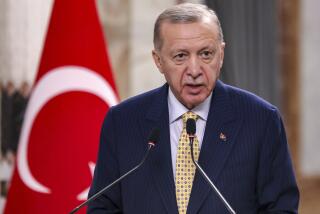Turkey’s Bid for Early Talks on EU Entry Fails
- Share via
COPENHAGEN — European Union leaders Thursday held out the prospect of membership to Turkey but dashed the country’s hopes for early talks.
If Turkey is found in a December 2004 review to qualify under EU criteria for human rights and democracy, accession talks would begin “as soon as possible,” Danish Prime Minister Anders Fogh Rasmussen said in announcing the decision.
He implied that negotiations would begin in early 2005, assuming the predominantly Muslim nation meets political requirements. Turkey, with the backing of the United States, had hoped talks would begin next year.
The action came on the first day of a summit expected to endorse the largest expansion in EU history, with agreement on terms for 10 new members, including eight from former Communist states. Applicants led by Poland were negotiating down to the wire, demanding more generous terms to help them catch up with the richer countries of Western Europe.
The summit also was wrestling with the thorny issue of how to welcome ethnically divided Cyprus into the European Union. Cyprus has been split since a 1974 Turkish invasion, which was triggered by a Greek Cypriot coup backed by the military junta then ruling Greece. U.N.-brokered negotiations are trying to find a solution.
Passions have been rising over the issue of allowing Turkey to become the first Muslim country to join the organization of predominantly Christian countries. The timing is especially sensitive since the U.S. is courting Turkey’s help if there is a war against Iraq.
“I’d like to stress that we aim at sending a positive signal to Turkey,” said Rasmussen, whose country currently holds the EU presidency. But he acknowledged it was uncertain how the offer would be seen. “I hope the Turkish government will receive the signal in the spirit in which it is sent.”
Turkish Prime Minister Abdullah Gul has insisted that recent democratic reforms already make the country ready for membership negotiations. He had lobbied hard for talks to start in 2003, declaring before the summit that “it’s our right to get a very firm, clear date to start the negotiations.”
British Foreign Secretary Jack Straw described the interlocking talks over Cyprus, Turkey’s entry bid and financial terms for new members as “the most complex matrix of negotiations in which the EU has ever been involved.”
Poland, the Czech Republic, Hungary, Slovakia, Slovenia, Lithuania, Latvia, Estonia, Cyprus and Malta are expected to conclude negotiations at the two-day summit under a deal that would make them members in spring 2004. The summit is also expected to support Bulgaria’s and Romania’s hopes for entry in 2007.
EU leaders want Turkey to help engineer reunification of Cyprus, and to refrain from taking any action if the internationally recognized Greek-ruled part of the island receives a separate invitation to join. Turkish Cypriots would be able to join later if they accept a reunification plan.
Financial negotiations were focused on a proposed $41-billion package to support new members. Candidates are seeking the full $43 billion originally budgeted for expansion. The EU’s key contributors, led by Germany, say they cannot afford that because of an economic slowdown.
Poland has led applicants arguing that more money should go to farmers and to build infrastructure such as roads and telephone networks. Financial disputes were expected to be worked out today.
Polish President Aleksander Kwasniewski told reporters in Warsaw on Thursday that the summit aims to build a “Europe united, free of 20th century divisions, a Europe able to take full advantage of its opportunities.”
Some supporters of Turkey charge that the hesitancy to welcome it is based not on questions of democracy or economic development but rather on its religion. Some want to let it join in part to disprove the charge that the European Union is a Christian club.
But others question the wisdom of bringing in such a large and relatively poor country with significant cultural differences from most of Europe.
Valery Giscard d’Estaing, the former French president heading an effort to draw up a new EU constitution, told the French newspaper Le Monde last month that Turkey’s membership would mean the end of the European Union.
“Its capital is not in Europe, 95% of its population is outside Europe, it is not a European country,” D’Estaing said. Turkey, he added, has “a different culture, a different approach, a different way of life.” He claimed that most EU states were privately against admitting Turkey, but “they never say it to the Turks.”
Turkey is concerned that new members, fearing competition from a large and low-wage country, might be even less supportive of its entry than are the richer countries of Western Europe.
But Jan Kulakowski, Poland’s former chief EU negotiator and now a presidential advisor on EU integration, said it is better “to see Turkey in the European Union rather than in the bloc of fundamentalist Islamic countries.”
*
Ela Kasprzycka of The Times’ Warsaw Bureau contributed to this report.
More to Read
Sign up for Essential California
The most important California stories and recommendations in your inbox every morning.
You may occasionally receive promotional content from the Los Angeles Times.













